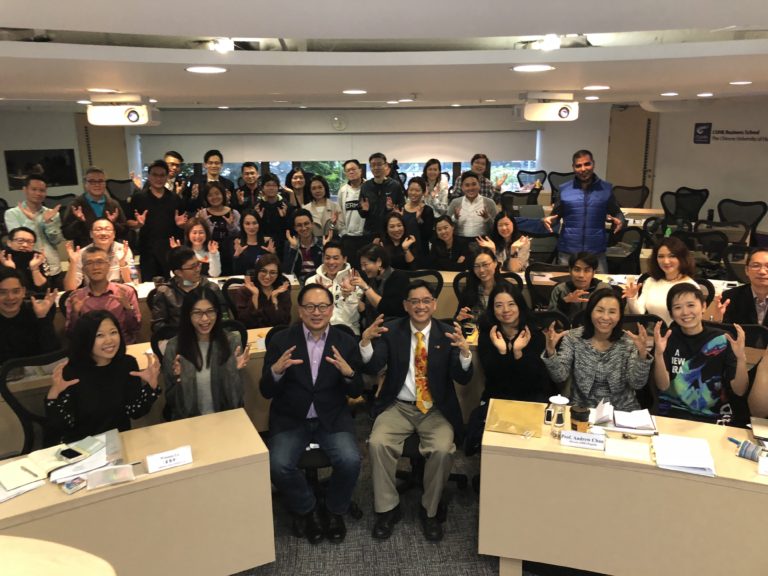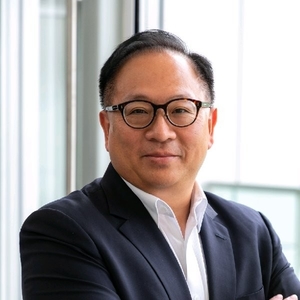AI Is Changing Global Leadership—This Hong Kong MBA Can Help You Adapt

From diplomatic decisions to customer experience optimization, AI is popping up everywhere. At CUHK Business School in Hong Kong, MBAs are learning how to master it
Last year, it was reported that the Chinese government had started using Artificial Intelligence (AI) to make diplomatic decisions.
To some, this might be a sign of a bleak future where real people are at the mercy of robots. To others, however, it is a sign of the increasingly important role that AI is playing in management—and an indication of its potential in creating change.

“People can see that it’s the future,” says Dr Toa Charm, a professor at CUHK Business School in Hong Kong. “No matter whether it’s in the government or the commercial world, people are getting more and more serious about AI, and that will mean we’ll see more AI leaders as investors and also in companies.”
Dr Charm knows what he’s talking about: he has been working in tech innovation in Asia for more than 30 years, with international companies like HSBC and Oracle, and has been a professor at CUHK for a few years.
His focus in recent years has been Hong Kong’s startup ecosystem; in particular, getting MBAs involved in the rapid growth that the region is experiencing and helping them create long-term success.
Key to this is an understanding of the potential of disruptive technologies like AI—whether that’s their decision-making capabilities, as evidenced in the case of the Chinese government, or other uses, such as cutting costs, or identifying the preferences of customers.
“You have to teach both sides of AI”
On the CUHK MBA, students have the opportunity to participate in a suite of technology-focused courses that explore these topics, such as the Digital Breakthrough Strategies which teaches students how to lead in industries that are being disrupted by technologies.
However, as Dr Charm explains, essential to all of these courses is an even-handed approach, and he cautions his MBAs against forgetting the potential repercussions of the innovations they pursue.
“Rather than just making business or making money, students can make use of technology like AI to make a social impact,” he points out, suggesting environmental protection and financial inclusion initiatives that allow poorer people to get access to financial services.
“And, of course, they have to understand the potentially negative side of AI, such as people losing their jobs, or ‘discrimination by algorithm.’”
Tech considerations are built-in to the business ethics course at CUHK Business School, and for Dr Charm, this holistic attitude offers a helping hand in his mission to stimulate his MBAs, as well as the corporate partners he works with, to be more responsible when they are leveraging AI.
“You have to teach both sides,” he says. “How you might displace some of the staff [with AI technology], but how you can deploy those staff to do other jobs—how you can retrain them, reskill them to become AI literate. It’s all important to be an organization of the future.”
“Students will understand more about the challenges we face”
Hong Kong is certainly a good environment to be learning these lessons. Together with the nearby Shenzhen, the region’s innovation and technology sector was ranked the world’s second-largest in 2018’s Global Innovation Index.
Not only that, but the growth of the startup ecosystem has been accelerating in the last few years, with a 16% increase in the number of startups between 2016 and 2017, and a 21% increase in startup employees in the same period.
On the CUHK Business School MBA, Dr Charm helps students to penetrate and get the most from this environment.
“I’m a professor of practice,” he explains, “so from my past 30 years in the industry I have all of these connections, whether they’re business leaders or tech leaders.
“I invite them [to CUHK] as guest speakers to share their experience in the real world. I also brought in internship opportunities for the students and enabled them to make use of their innovative ideas to solve enterprises’ pain points.”
This privileged access to industry experts is a core part of the preparation that CUHK Business School gives its MBAs to enter an AI-disrupted world, and in combination with the school’s equal academic offering, Dr Charm believes that MBAs are well-placed to succeed in any industry, even disrupted ones.
“That’s the beauty of CUHK,” he says. “We have the academic people who continue to discover knowledge, but on the other hand we have professors of practice, people who are not directly from the academic field and are mostly from industries.
“Students will understand how to research and seek out new knowledge, but they will also understand more about the real world, and what kind of challenges we face.”
Media: BusinessBecause
Section: News/ MBA Degree
Date published: 17 May 2019

